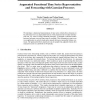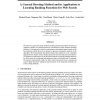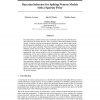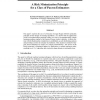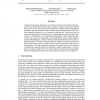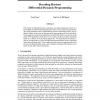57
Voted
NIPS
2007
15 years 2 months ago
2007
We introduce a functional representation of time series which allows forecasts to be performed over an unspecified horizon with progressively-revealed information sets. By virtue...
NIPS
2007
15 years 2 months ago
2007
Over the past few years, the notion of stability in data clustering has received growing attention as a cluster validation criterion in a sample-based framework. However, recent w...
NIPS
2007
15 years 2 months ago
2007
We present a general boosting method extending functional gradient boosting to optimize complex loss functions that are encountered in many machine learning problems. Our approach...
109
Voted
NIPS
2007
15 years 2 months ago
2007
Generalized linear models are the most commonly used tools to describe the stimulus selectivity of sensory neurons. Here we present a Bayesian treatment of such models. Using the ...
NIPS
2007
15 years 2 months ago
2007
This paper1 explores the use of a Maximal Average Margin (MAM) optimality principle for the design of learning algorithms. It is shown that the application of this risk minimizati...
39
Voted
NIPS
2007
15 years 2 months ago
2007
121
Voted
NIPS
2007
15 years 2 months ago
2007
Unsupervised learning algorithms aim to discover the structure hidden in the data, and to learn representations that are more suitable as input to a supervised machine than the ra...
NIPS
2007
15 years 2 months ago
2007
The control of high-dimensional, continuous, non-linear dynamical systems is a key problem in reinforcement learning and control. Local, trajectory-based methods, using techniques...
NIPS
2007
15 years 2 months ago
2007
We present a new and efficient semi-supervised training method for parameter estimation and feature selection in conditional random fields (CRFs). In real-world applications suc...
NIPS
2007
15 years 2 months ago
2007
This paper proposes constraint propagation relaxation (CPR), a probabilistic approach to classical constraint propagation that provides another view on the whole parametric family...
